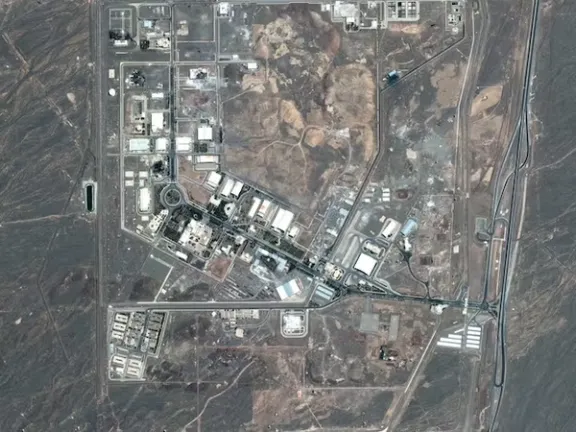Khamenei Says Israel 'Must Be Punished' For Syria Attack

Iran's Supreme Leader, Ali Khamenei, said on Wednesday that Israel "must be punished and it shall be" for attacking the Iranian embassy compound in Syria that killed top IRGC generals.

Iran's Supreme Leader, Ali Khamenei, said on Wednesday that Israel "must be punished and it shall be" for attacking the Iranian embassy compound in Syria that killed top IRGC generals.
In a major escalation of Israel's war with regional adversaries, suspected Israeli warplanes launched a precision strike on Iran's consulate in the Syrian capital on April 1 in a strike killing seven IRGC Quds Force officers involved with controlling Iran's armed proxies.
"When they attack the consulate, it is as if they have attacked our soil," Khamenei said in a speech marking the end of the Muslim holy month of Ramadan. "The evil regime made a mistake and must be punished and it shall be," he added.
Iranian official have repeatedly threatened retaliation but so far no attack has been launched, with amny in Iran urging caution and "strategic patience."
In an apparent response to Khamenei, Israeli Foreign Minister Israel Katz said on Wednesday that Israel will respond if Iran attacks Israel from its own soil.
"If Iran attacks from its own territory, Israel will respond and attack in Iran," Katz said in post on the social media platform X.
Iran backs groups that have entered the fray across the region since Israel launched its invasion of Gaza following the October 7 attack on southern Israel by Hamas that killed more than 1,000 civilians.
Some 33,360 Palestinians have been killed in six months of Israeli bombardment of Gaza, according to unverified numbers issued by Hamas. Israel says around 10,000 Hamas militants were among those who died during its military operation.
The Iran-backed Lebanese Hezbollah group has exchanged fire on a daily basis with Israel, while Iraqi groups have fired on US forces in Syria and Iraq and the Houthis of Yemen have targeted shipping in the Red Sea and the Gulf of Aden.
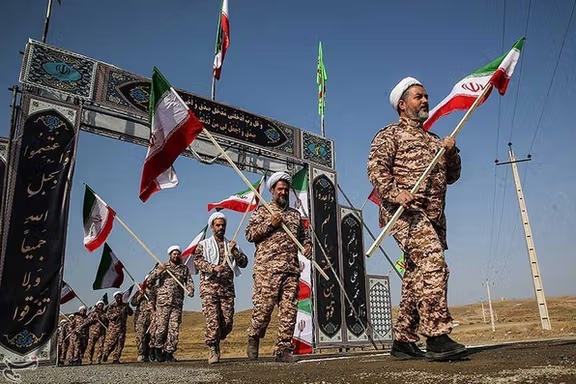
Media and citizens in Iran have been discussing the potential involvement of Russia and Syria in providing intelligence to Israel regarding the locations of IRGC officers prior to a precision strike last week.
Speculations are arising amidst calls from Iranian hardliners for a rapid and decisive reaction to the Israeli strike on April 1, targeting the Islamic Republic's Consulate in Damascus, resulting in the deaths of two top IRGC Quds Force generals and five other officers.
Meanwhile, Iranian officials and military commanders have maintained their stance that Iran will retaliate at a time of its choosing.
Conversely, reports in some Arab media outlets suggest that Iran might refrain from seeking revenge on Israel if Tel Aviv backs away from the notion of attacking Rafah in its conflict with Hamas.
In an editorial on April 8, Masih Mohajeri, the influential managing editor of Jomhouri Eslami daily, a newspaper that was founded by Ali Khamenei in 1979, asked: "Why Russia, which controls the Syrian airspace does not prevent air strikes on Iranian targets in Syria?" Also implicating Syria and possibly Iranian infiltrators in tipping off the Israelis, Mohajeri wrote: "We have had too many losses in Syria during the past months and this is certainly because of the treason by infiltrators."
Since December, Israel has eliminated 18 high ranking IRGC officers in Syria, in what appears to be a systematic campaign to limit the danger of Iranian proxies on its borders. Almost all the IRGC generals and officers stationed in Syria and Lebanon are tasked with directing and coordinating a mixture of Afghan, Iraqi, Syria and Lebanese proxy forces.
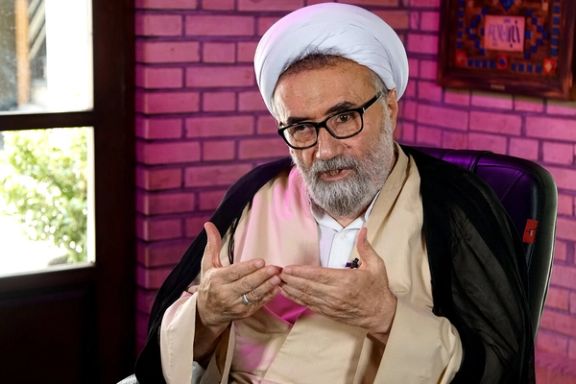
"We had warned about this repeatedly during the past months, but no one seems to have heard the warnings. Have Iranian officials ever asked themselves why such attacks never take place against Russian forces in Syria and why Russia's advanced air defense does not prevent Israel's crimes against Iran?"Jomhouri Eslami wrote.
The editorial emphasized that slogans like "replacing fallen officers with fresh blood" overlook the significant investment Iran has made in the expertise, skill, and efficiency of the highly trained officers who were lost. The publication highlighted Iran's robust intelligence and security capabilities, suggesting that these assets should be utilized to prevent such tragic losses in the future.
Advocating for a comprehensive review of Iran's security apparatus, the editorial posed critical questions: "Instead of boasting after each attack, why not prioritize preventive measures? Isn't it time to reassess our security posture?"
Meanwhile on social media, Ehsan Arian, an Iranian who appears to be an opposition activist with more than 23k followers, wrote more clearly about Syria's possible role in tipping off the Israelis. Arian wrote that it was clear since 2019 that Bashar al-Assad was simply tolerating the IRGC Qods Force's presence in Syria rather than welcoming it.
He suggested that Iranian security agencies have briefed the Supreme Council of National Security about the involvement of Syrian insiders and certain elements within the Iranian regime in the Israeli airstrikes targeting Iranian commanders and military advisers in Syria.
Iran had previously urged Syria to conduct a joint investigation into this matter following the killing of Seyed Razi Musavi in December. However, it seems that Iran has discovered that Syria's Intelligence organization and Presidential Guards impeded the investigation, as stated in the tweet from April 9.
The lengthy tweet continued to assert that subsequently, Iran and Hezbollah conducted a separate investigation, which revealed the involvement of Iranian infiltrators and Syrian agents. If these reports are confirmed, it is unlikely that Bashar Assad was unaware of them.
The tweet, however, did not dismiss the potential role of Russian forces collaborating with Syrian officers. Hezbollah acknowledges that many of its members killed in Israeli airstrikes since October 7 had some form of contact with Russian and Syrian intelligence, according to the tweet.
Other reports on social media also say Syrian officers who wish Iran to leave Syria give away the whereabouts of Iranian officers to Israelis.
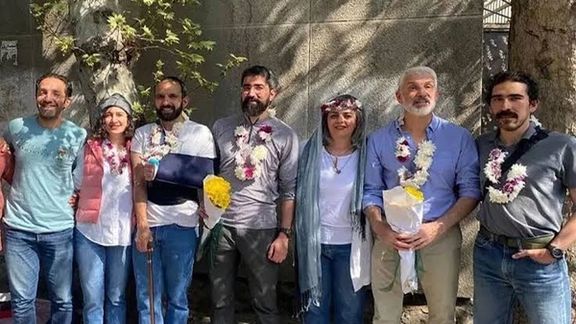
Four Iranian environmentalists convicted on trumped-up charges of acting against national security and spying for the United States and Israel have been “pardoned” and freed from prison.
Niloufar Bayani and Houman Jowkar’s release from Tehran’s Evin Prison Monday was followed by the release of two others, Sepideh Kashani and Taher Ghadiriyan, on Tuesday.
However, many Iranians expressed outrage on social media that these individuals were jailed and tortured for six years as spies and then pardoned. If they were spies, why the government released them, they asked.
In total eight members of the Persian World Heritage Foundation (PWHF) -- were arrested by the Revolutionary Guards (IRGC) Intelligence Organization (SAS) during moderate President Hasan Rouhani’s second term in January and February 2018.
Three of the remaining members of the group – Sam Rajabi, Amir-Hossein Khaleghi and Abdolreza Kouhpayeh – had been released from prison before after serving their sentences. Another member, Morad Tahbaz, a co-founder of PWHF who had the citizenship of both the United States and Britain besides his Iranian citizenship, was believed to be held hostage as leverage in deals with the US. He was freed during a prisoner exchange with the United States in September 2023.
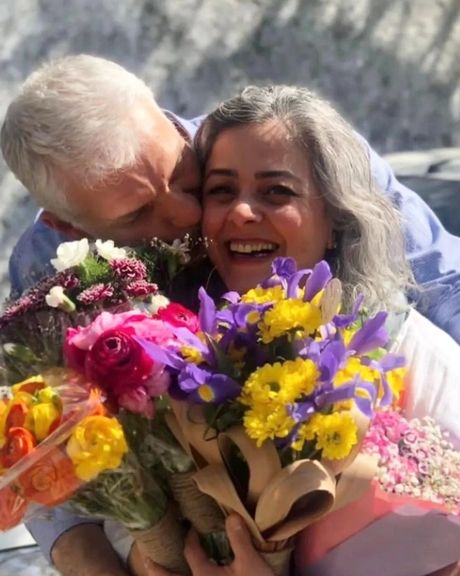
PWHF, an NGO dedicated to the conservation of wildlife in Iran, was founded by Iranian-Canadian Professor Kavous Seyed-Emami, who was also arrested. Two weeks after his arrest, however, his family was told he had committed suicide in his cell at the age of 63.
Tehran Prosecutor Jafari-Dolatabadi in February 2018 claimed the detainees had collected sensitive information on Iran's missile bases for the CIA and Mossad under the guise of environmental conservation activities such as installation of wildlife monitoring cameras. Based on interrogations by SAS, they were accused of espionage.
“But considering the existence of satellites and spying systems around Iran and in its skies the question arises as to why anyone would use cameras for spying. What danger or problems could that cause!?” a conservative newspaper, Farhikhtegan, asked after the announcement that the environmentalists were pardoned.
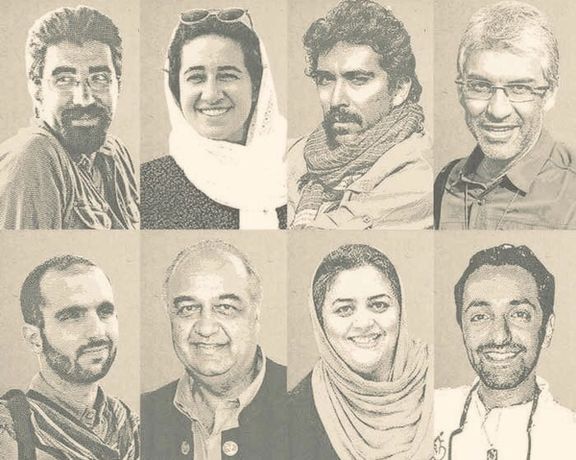
The UN High Commissioner for Human Rights, members of the European Parliament, Human Rights Watch and Amnesty International repeatedly urged Iran to release the environmentalists from prison at the time.
Vice-President and Head of the Department of Environment, Isa Kalantari, said at the time that his department and the Intelligence Ministry had investigated the matter and had found no evidence of spying in the activities of the environmentalists.
Speaking to Iran International after Bayani and Jowkar’s release from prison Monday, Kaveh Madani, Director of the United Nations University Institute for Water, Environment and Health, also attributed the IRGC’s arrest of the environmentalists to the conflicts between the IRGC’s Intelligence Organization and the Ministry of Intelligence and the former’s schemes against officials of the Rouhani administration.
“It is not easy to explain why they are being freed at this particular time,” Madani added.
At least five of the environmentalists, who were sentenced from four to ten-years in prison in February 2020 after secret trials, went on hunger strike during their imprisonment. Most of them were held in complete isolation, for as long as nine months in Bayani’s case. They often did not even have access to their court-appointed attorneys.
The environmentalists were tortured to agree to ‘confessions’ scripted by interrogators. Two of the accused – Tahbaz and Bayani – made confessions against themselves and others but both retracted their confessions later.
In letters smuggled out of prison Bayani alleged psychological torture including threats of rape. Her letters, first made public by the BBC’s Persian Service, included a claim she was shown torture equipment and syringes that interrogators said could paralyze or kill her.
The lawyer representing Kashani, said his client had faced similar treatment. Kashani’s husband and co-defendant Houman Jowkar, was said to have been brutally beaten and then paraded in front of her covered in blood. Jowkar sustained serious injuries, including a broken head and injuries to his face when his glasses were smashed onto his face.
A source who spoke to Iran International in June 2022 said IRGC interrogators had secretly filmed Tara Tahbaz, the daughter of Morad Tahbaz, at a café in New York and shown it to him in prison in 2018, threatening to kill Tara if her father did not agree to accept the scripted confessions. They also contacted Tara and made threats against her.
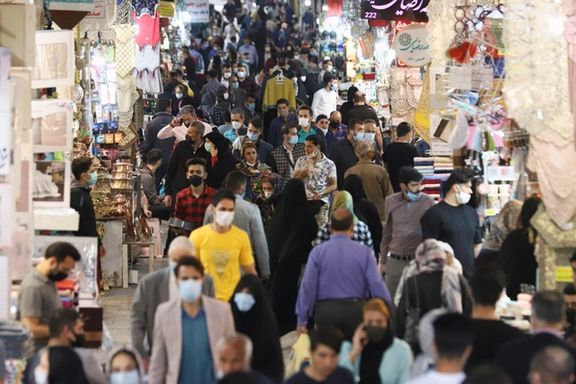
Opinion - For far too long, the Iranian people have been subject to the whims of a repressive regime, stifling their aspirations for freedom, prosperity, peace with Israel and self-determination.
The time has come for the world to acknowledge the resilience and yearning for liberty within Iran and to support Iranians in charting their own destiny.
For years, I had the honor of serving as the Executive Director of the Iranian Americans for Liberty. Every day in this role, we pushed back against the Regime’s mouthpieces in the United States while exposing the Regime in Tehran for the oppressive dictators that they are.
Iran, with its rich history and vibrant culture, deserves better than to be shackled by the oppressive rule of a theocratic regime that is far more interested in leading the world in funding terrorist proxies such as Hamas, Hezbollah, the Houthis, and others than in supporting their own people. Despite facing immense challenges and systematic repression, the Iranian people have shown remarkable courage and resilience in their quest for freedom and democracy.
The waves of protests over the last couple of years that swept across Iran is a testament to the growing frustration and disillusionment with the current regime. From economic hardships to political oppression, Iranians from all walks of life are demanding change and are unwilling to accept the status quo any longer.
And you know what, we, the United States should be supporting them and not unfreezing billions of dollars to the Regime. This is madness!
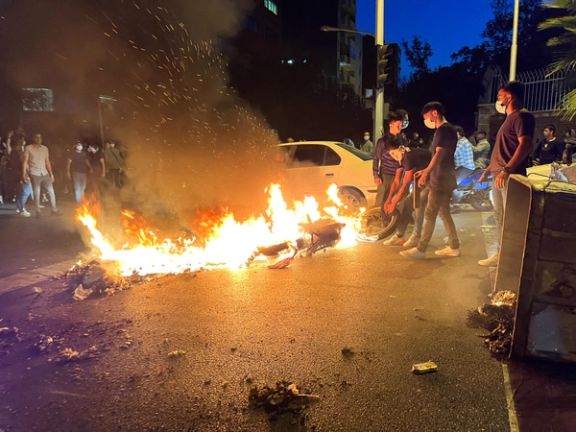
It is incumbent upon the international community to stand in solidarity with the Iranian people and support their aspirations for freedom and democracy. This means holding the Iranian regime accountable for its egregious human rights abuses, its support for terrorism, and its destabilizing activities in the region.
When we look around the Middle East, the only reason Hamas and Hezbollah are able to operate at such a high level is because of the financial, material and logistical support they receive from the Regime. The Saudis, Emiratis and other leaders in the region are not the ones funding terrorist groups!
Moreover, it is imperative to empower civil society organizations, human rights activists, and independent media within Iran to amplify the voices of the Iranian people and promote democratic values. By providing moral, diplomatic, and material support to these grassroots movements, the international community can help Iranians reclaim their rightful place as masters of their own destiny.
I don’t think the Iranian people are not asking for handouts; they are demanding the fundamental rights and freedoms that are enshrined in the Universal Declaration of Human Rights that the United States claims to support.
They deserve the opportunity to choose their own leaders, to express themselves freely, and to pursue their dreams without fear of persecution or reprisal.
It is time for the world and President Biden in particular to stand with the Iranian people in their quest for freedom and democracy. It is time to support their efforts to chart their own destiny and to build a future that is based on justice, equality, and respect for human rights. The Iranian people have waited long enough; now is their time to act and every freedom and liberty loving American should be supporting them!
The opinions expressed by the author are not necessarily the views of Iran International
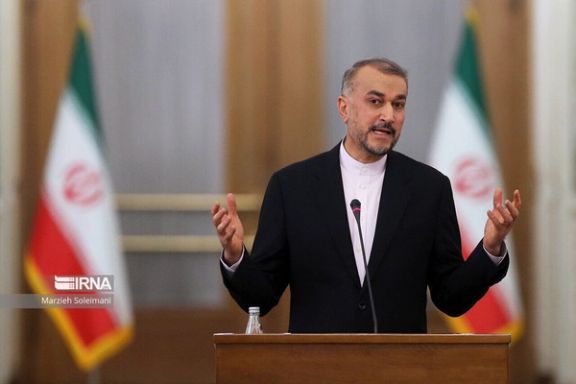
Following Israel's bombing of Iran's embassy complex in Syria, Iranian Foreign Minister Hossein Amir-Abdollahian's upcoming visit to New York has stirred controversy.
Sources have told Amwaj.media that entry visas have been issued for Amir-Abdollahian and his delegation, while Tehran continues to support militant groups in the Middle East, who are engaged in attacks on international shipping and against Israel. Observers have raised alarms, particularly as his visit aligns with the anniversary of the 1983 bombing of the US embassy in Lebanon, believed to have been organized by Iranian agents working with proxies.
Against the backdrop of the Gaza conflict, Iran and the United States have reportedly engaged in indirect communication, seeking to prevent further escalation. Talks between the two nations, held in Oman in January, have continued through parallel channels, with Iran pressing for US intervention to compel a ceasefire in Gaza while the US seeks to limit Iranian activities in Iraq, Syria, and Yemen.
Events, including the deadly drone attack on a US military facility in Jordan and Israel's bombing of the Iranian consulate in Syria, have further strained relations. While Washington has emphasized holding Iran accountable for its actions, Iran has alleged US complicity in the Israeli attacks and demanded accountability from Washington.
However, the United States has moved to clarify that it had no prior knowledge of the April 1 bombing and firmly asserts that any retaliation against its interests is deemed unacceptable.
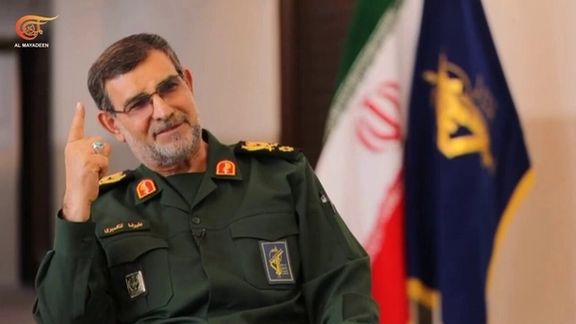
Frustrated over the apparent inaction of Iran after Israel's airstrike on the country's Damascus consulate, a senior Revolutionary Guard Commander has called for a coalition of Muslim armies to retaliate.
Alireza Tangsiri, Commander of the Navy of the IRGC, claimed that “the only way to confront Zionists is to create a coalition of Islamic armies,” the latest in a string of military top brass in Iran along with government officials to call for strong retaliatory action.
His comments come as an unconfirmed report suggests that Tehran made assurances to Washington that it would not retaliate against Israel following an airstrike that killed two IRGC commanders and five senior military officials in Syria.
The alleged agreement is seen by some as Tehran's attempt to avoid escalating tensions with both Israel and the United States, potentially in pursuit of sanctions relief. Speculation remains that Iran's proxies would carry out retaliatory attacks as opposed to Iran.
Since the outbreak of the Gaza war, triggered by Iran-backed Hamas's invasion of Israel, Iran's proxies have been attacking Israel from Gaza, the Lebanon border, Syria and from the Red Sea coast in the country's south.
While Iranian officials have issued threats of retaliation, led by the Supreme Leader, they have also exercised caution, claiming that they will act at an opportune time and under suitable conditions.
